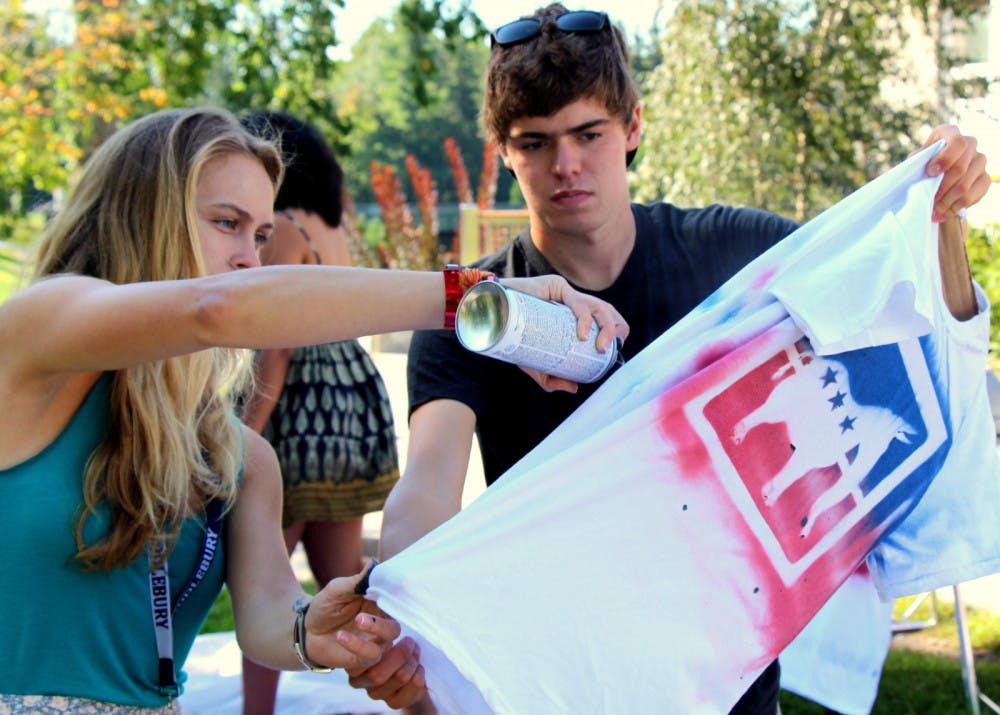This past April, Middlebury College entered into a one-year contract with TurboVote, online software that seeks to streamline the voter registration process.
“It takes three minutes to sign up, and you can register in any state,” said Hannah Bristol ’14.5, who worked at TurboVote this past summer after leading the initiative to bring the software to campus.
Once registered, TurboVote will send text reminders of local and national elections to registered voters. The company also sends absentee ballot requests directly to the College, which as a part of its contract has agreed to pay for the postage for up to 4,000 users within the Middlebury community, including faculty and staff.
Before TurboVote, MiddVote, the student group that brought this software to the community, carried paper registration forms for students, but state regulations only allowed the forms to be held for a certain amount of time.
“It was messy legally,” explained Kate Hamilton ’15.5, who is running MiddVote this year with Bristol.
The process to vote from Middlebury can be tricky for students voting at home. They have to register to vote, request absentee forms, fill out those forms and send them back to the home state, only for the ballot to be sent back and filled out for the election.
“It can be logistically challenging and time consuming,” added Bristol.
TurboVote seeks to make the process of registering and voting in local and national elections as easy as possible.
“The software really does help multiple groups of people,” explained TurboVote Director of Partnerships Sam Novey. “It helps non-registered citizens become registered, but also helps people who were previously registered in local elections that they may not know were occurring. It also simplifies the process for people who would vote anyways, in local or national elections, but may have a more difficult experience doing so.”
TurboVote, which began as a pilot program at Boston University in 2010, has now entered into contract with 208 different universities and registered over 200,000 voters.
The majority of the registered colleges and universties are in Florida, where all of the state’s public universities signed up for the software. Virginia schools, State University of New York (SUNY) schools, and Texas schools have also signed on.
“Educational institutions are easy clients to target for this product,” said Bristol. “Many students vote for the first time while they are in college, and especially at a school like Middlebury, many are voting absentee.”
Colleges also have a vested interest in investing in the software, as educational institutions are required by the federal Higher Education Amendments of 1998 to make a good faith effort to distribute voter registration materials.
Associate Director for Community Engagement Ashley Laux, who approved College funding for this product through the Community Engagement Office, confirmed that this year would be a trial.
“If it proves to be an effective way for students to register to vote and request absentee ballots, then we will look into renewing it,” she said.
People who vote when they are young are more likely to form a habit and vote regularly later in life, according to the Center for Information & Research on Civic Learning and Engagement (CIRCLE). Yet in the last midterm elections in 2010, only 45 percent of citizens 18-24 were registered and only 21 percent voted.
Since Sept. 16, 119 Middlebury students have registered to vote using TurboVote, with a big registration push coming this week in conjunction with National Voter Registration Day on Sept. 23. 109 of these students requested materials to vote absentee.
“I think it’s a really innovative software,” said President of College Democrats Chris Kennedy ’15. “It will have a substantial effect on the number of people MiddVote will be able to register this year. This in turn will greatly enhance our capacity as a school to engage in political dialogue.”
The Middlebury College Republicans did not respond to a request for comment.
Both TurboVote and MiddVote are nonpartisan and do not promote either political party.
Students face particular challenges when voting because of increasingly complicated voting requirements in some states. Because young people tend to vote left, voting has become a partisan issue, inspiring fierce national debates all the way to the Supreme Court, who overturned provisions of the Voting Rights Act of 1965 last summer. Students who live out of state for several years often face barriers to voter registration that permanent residents do not.
State regulations such as appearing in person to register or time restrictions that only allow for registration a month before elections make the process even more challenging for those completing the process out of state. But Bristol and Hamilton agree that Middlebury students must do everything they can to vote in the Nov. 6 elections.
“As college students we can’t run for office, we don’t have a lot of money, and we are underrepresented in most parts of our lives, but voting is where we are equal to our parents and grandparents,” said Bristol.
“The Boston Globe had this spread on the effort to register voters in the south after the Voting Rights act passed. I think so often people think of voting as something boring, and reading that article reminded me of what a hard-fought right it is for so many and how important it is to vote and honor the fight,” concluded Hamilton.




